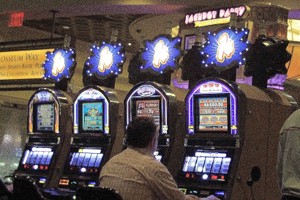When the first slot machines hit Michigan a couple of decades ago in a small tribal casino, the notion of spinning the wheels was enough of an unheard-of novelty that my mother and I drove two and a half hours to the central part of the state, for the pleasure of pumping our dimes and quarters into the slots in a small, crowded, smoky hall with a no-frills motel about a mile down the road.
Now, fast-forward 20-odd years and the United States sports so many gambling venues that for many consumers they’re a routine neighborhood attraction rather than a destination venue. And the proliferation of gambling opportunities means the casinos each are getting a slimmer piece of the pie, leading to problems in an apparently over-saturated industry.
For example, as of this month, three major casinos in Atlantic City will have shut down their gambling operations and hotels this summer alone, eliminating the jobs of thousands of workers. That follows the June closure of the Harrah’s casino and hotel in Tunica, Miss., another major U.S. gambling cluster.
The crumbling of Atlantic City is a pretty good news peg for taking a look at your market’s casino operations. (And if their aren’t any, how about a look at what level of casino tourism your area’s consumers generate for nearby markets?) For the most part it seems that Americans still are spending heftily on gambling but the pattern of the getaway week or weekend has given way to shorter drop-ins at the local hall.
The University of Nevada at Las Vegas has a Center for Gaming Research that might also be a helpful source of stats and data. And of course the industry trade group, the American Gaming Association, offers a lot of stats including its State of the State report which gives numbers for individual markets. If you are including tribal casinos in your report — more difficult because of less transparent reporting requirements — try IndianGaming.com and this organization, Casino City Press — ask if they’ll share their market research reports free of charge with journalists.
Beyond the casino companies themselves, you can look at the economic impact of gambling in your community. It s a huge topic that is fraught with different special-interests and views, of course. The topic isn’t as hot as it was 10 years ago during the proliferation but you might check with your region’s federal reserve bank for any studies and commentary; this 2003 report from the St. Louis Fed might help in understanding some of the issues and metrics to evaluate. Be sure to track down suppliers from food distributors to construction and cleaning firms about the effect on them of waxing and waning casino attendance. Many are required to be licensed by the state gaming commission so check for lists of vendors there.
One thing I would recommend for anyone on the casino, real estate/economic development, personal finance or marketing beats: Sign up for the loyalty programs at all of your area’s gambling centers. I am on the mailing list for several national ones such as the Caesar’s Entertainment Total Rewards program as well as a few for local standalone casino/hotels. In a highly competitive market, return visits are the lifeblood of a casino. Here’s a report on “The lowdown on casino loyalty programs” that shows some metrics about how they drive business for gambling parlors. Here’s a 2010 paper from the University of San Francisco on the effectiveness of casino loyalty programs that makes some interesting differentiations about casino player segments (“Mr. High Roller” vs. “Happy-go-lucky,” for example) and a blog post from the marketing association Loyalty360 about casino programs. (Good blog to bookmark for a variety of beats, by the way.)
Tea leaves in casino marketing
The frequency of their direct-mail pitches and the interesting psychology behind the marketing ploys are quite interesting and dissecting them might form the basis for some interesting heads-up for readers. Obviously, gambling fulfills (or not, for problem gamblers) some emotional needs as well as filling entertainment hours, and deciphering the ways companies connect emotionally with consumers is fascinating.
For example, one chain with a casino near me is constantly sending “offers” for giveaways of items like coolers, camp chairs, small appliances or housewares like wine glasses and down comforters. It’s pretty apparent they buy overstock or outlet items for pennies on the dollar and woo consumers with the bait of a “free” electric griddle or spa bathrobe that probably cost the casino $10 or $15. Odds are the consumer will plop down and spend far more than that at a table or gambling machine, of course. Other common lures include gift cards for name-brand gas stations, or even gift cards to big-box chains like Best Buy. Special events like free-car drawings and raffles also are common to get people in the door.
If you don’t want to join the “players clubs” yourself or won’t gamble enough to keep yourself on their active mailing lists, it might be fascinating to enlist some regular patrons and ask them to save up their casino direct-mail pieces for a month, a quarter or even a year. Of course, players who spend more get more — free concert tickets, private dinners, parking privileges and meal “comps,” etc. — and if you can find some brave consumers who will share their win/loss statements as well as their direct-mail advertising, you could tote up each and show prospective gamblers what those “free” coolers, buffet dinners and the like are really costing them. (And I have nothing against gambling but do think everyone should approach it with a realistic view of casino tactics.)
Might be interesting to check with area bankruptcy attorneys, CPAs, debt counselors, etc. to see if they are seeing more or fewer consumers with gambling-related problems.











